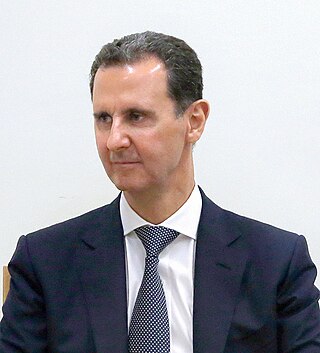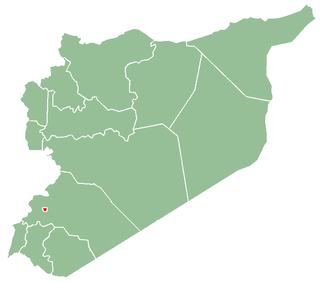
Bashar al-Assad is a Syrian politician who is the current and 19th president of Syria since 17 July 2000. In addition, he is the commander-in-chief of the Syrian Armed Forces and the secretary-general of the Central Command of the Arab Socialist Ba'ath Party, which nominally espouses a neo-Ba'athist ideology. His father and predecessor was General Hafiz al-Assad, whose presidency in 1971–2000 marked the transfiguration of Syria from a republican state into a de facto dynastic dictatorship, tightly controlled by an Alawite-dominated elite composed of the armed forces and the Mukhabarat, who are loyal to the al-Assad family.

Assef Shawkat was a Syrian military officer who was the Deputy Minister of Defense of Syria from September 2011 until his death in July 2012.
Terrorism in Syria has a long history dating from the state-terrorism deployed by the Ba'athist government since its seizure of power through a violent coup in 1963. The Ba'athist government have since deployed various types of state terrorism; such as ethnic cleansing, forced deportations, massacres, summary executions, mass rapes and other forms of violence to maintain its totalitarian rule in Syria. The most extensive use of state terrorism in the 20th century was during 1970s and 1980s, when Islamic uprisings across Syria where crushed through bloody campaigns of intense repression, culminating in the 1982 Hama massacre which killed around 40,000 civilians.

Hasan Ali Turkmani was a prominent Syrian military commander and Arab Socialist Ba'ath Party member. He served as the Minister of Defense in Syria from 2004 to 2009.

The General Intelligence Directorate, also known as the General Security Directorate or Syrian GID, is the most important civil intelligence service of Syria and plays an important role in quelling internal dissent. The General Intelligence Directorate conducts surveillance of the Syrian population, directs foreign intelligence, and monitors activities in Lebanon.

The 2008 Damascus car bombing was a car bombing that occurred on 27 September 2008 in the Syrian capital of Damascus. The explosion left 17 people dead and 14 injured. A car, laden with 200 kilograms of explosives detonated in the Sidi Kadad suburb of the capital, at approximately 8:45am. The blast occurred roughly 100 metres from a security installation on the road to Damascus International Airport at an intersection leading to the Sayyidah Zaynab Mosque, popular with Shia pilgrims from Iran and Lebanon. Security forces cordoned off the area.
Hafez Mohamad Makhlouf, also known as Hafez Makhlouf, is a retired Syrian colonel and former intelligence officer who was head of the Damascus branch of the Syrian General Intelligence Directorate. He was a member of Syrian president Bashar al-Assad's "inner circle" of close supporters.
Major General Hisham Ikhtiyar ; 1941 – 20 July 2012) was a Syrian military official, and a national security adviser to president Bashar al-Assad.
The following is a timeline of the Syrian Civil War from May to August 2011, including the escalation of violence in many Syrian cities.

Dawoud Abdallah Rajiha was a Syrian military officer who was the Minister of Defense from 2011 to July 2012 when he was assassinated along with other senior military officers by armed opposition forces during the country's Civil War. From 2009 to 2011, Rajiha served as chief of staff of the Syrian Army.
The following is a timeline of the Syrian uprising from September to December 2011. This period saw the uprising take on many of the characteristics of a civil war, according to several outside observers, including the United Nations Commission on Human Rights, as armed elements became better organized and began carrying out successful attacks in retaliation for the ongoing crackdown by the Syrian government on demonstrators and defectors.
The Rif Dimashq clashes were a series of unrests and armed clashes in and around Damascus, the capital of Syria, from November 2011 until a stalemate in March 2012. The violence was part of the wider early insurgency phase of the Syrian civil war. Large pro-government and anti-government protests took place in the suburbs and center of Damascus, with the situation escalating when members of the Free Syrian Army (FSA) started attacking military targets in November.
On 23 December 2011, two seemingly coordinated bombings occurred in the Syrian capital of Damascus. The alleged suicide car bombs exploded outside Syrian military intelligence agency buildings, killing 44 people and injuring 166. According to Syrian state media, most of the dead were civilians. The attacks took place during the Syrian uprising. The Syrian government blamed Islamist militants, while the Syrian opposition accused the government of staging the attacks to justify its crackdown on the uprising.
The following is a timeline of the Syrian Civil War from January to April 2012, during which time the spate of protests that began in January 2011 lasted into another calendar year. An Arab League monitoring mission ended in failure as Syrian troops and anti-government militants continued to do battle across the country and the Syrian government prevented foreign observers from touring active battlefields, including besieged opposition strongholds. A United Nations-backed ceasefire brokered by special envoy Kofi Annan met a similar fate, with unarmed UN peacekeepers' movements tightly controlled by the government and fighting.
On 6 January 2012, a bomb exploded in the Al-Midan district of Damascus, Syria. According to the Syrian government, a suicide bomber attacked buses carrying riot police shortly before an anti-government protest was to begin. It said that 26 people were killed and over 60 were injured. Most of the victims were civilians, though the Syrian government showed footage of what it claimed to be the funeral of 11 police officers killed in the attack.
The following is a timeline of the Syrian Civil War from May to August 2012. The majority of death tolls reported for each day comes from the Local Coordination Committees, an opposition activist group based in Syria, and the Syrian Observatory for Human Rights, another opposition group based in London.
The 10 May 2012 Damascus bombings were carried out using a pair of car bombs allegedly detonated by suicide bombers outside a military intelligence complex in Damascus, Syria. Combined, the perpetrators detonated more than 1,000 kilograms (2,200 lb) of explosives, tearing the facade off a 10-story building. With 55 people confirmed dead and almost 400 others injured, the attack was the deadliest bombing to date in the Syrian Civil War, though later outpaced by other events.

The Battle of Damascus, also known as Operation Damascus Volcano, started on 15 July 2012 during the Syrian civil war. It is unclear who started the battle. Thousands of rebels infiltrated Damascus from the surrounding countryside. Following this, according to some reports, the opposition forces launched an operation to capture the capital, while according to other reports, the military learned of the large-scale rebel operation beforehand and made a preemptive strike. Some reports even suggested the rebels launched the operation prematurely due to their plans being discovered by the security forces.
The Central Crisis Management Cell(CCMC) (Arabic: خلية إدارة الأزمة السورية), also known as the Syrian Crisis Cell, was a secret security committee established by the Syrian government in March 2011 to coordinate the response to civilian protest and internal dissent. It was headed by Syrian President Bashar al-Assad, and its members included the heads of the National Security Office, Military Intelligence Directorate, Air Force Intelligence Directorate, Political Security Directorate, and General Intelligence Directorate, as well as the Ministers of Interior and Defense.







